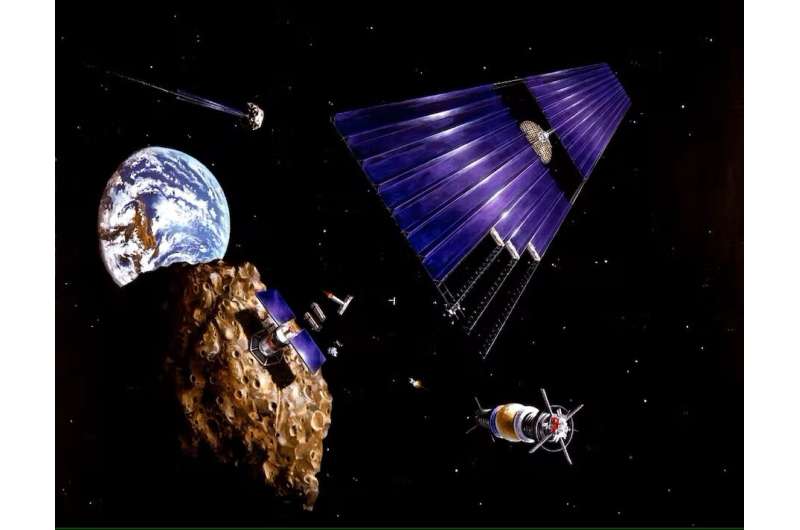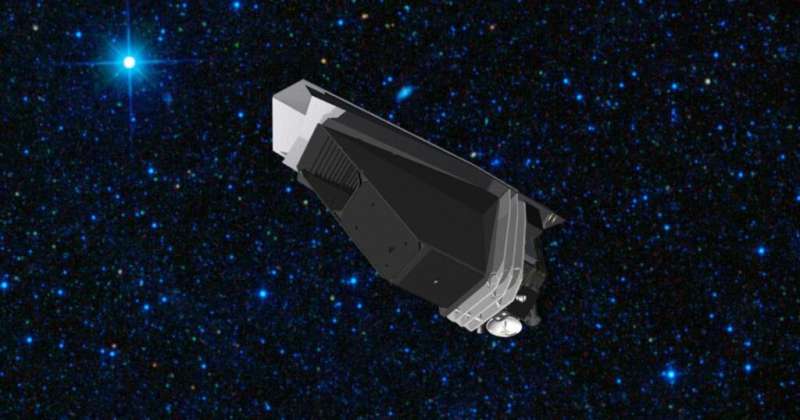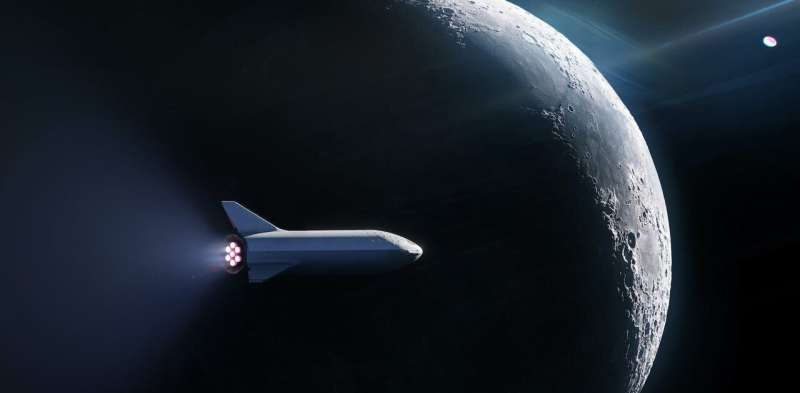
Copernical Team
The world's largest turbulence simulation unmasks the flow of energy in astrophysical plasmas
 Researchers have uncovered a previously hidden heating process that helps explain how the atmosphere that surrounds the Sun called the "solar corona" can be vastly hotter than the solar surface that emits it.
The discovery at the U.S. Department of Energy's (DOE) Princeton Plasma Physics Laboratory (PPPL) could improve tackling a range of astrophysical puzzles such as star formation, the o
Researchers have uncovered a previously hidden heating process that helps explain how the atmosphere that surrounds the Sun called the "solar corona" can be vastly hotter than the solar surface that emits it.
The discovery at the U.S. Department of Energy's (DOE) Princeton Plasma Physics Laboratory (PPPL) could improve tackling a range of astrophysical puzzles such as star formation, the o NASA, Alaska researchers to scan asteroid with radio waves
 Researchers are preparing for a potentially "catastrophic" close encounter with an asteroid in 2029 by scanning an asteroid with radio waves on Tuesday.
NASA is teaming with scientists from the University of Alaska Fairbanks' Geophysical Institute to send about 9.6 million radio waves to 2010 XC15, an asteroid that will pass by about twice the distance from Earth to the Moon.
The
Researchers are preparing for a potentially "catastrophic" close encounter with an asteroid in 2029 by scanning an asteroid with radio waves on Tuesday.
NASA is teaming with scientists from the University of Alaska Fairbanks' Geophysical Institute to send about 9.6 million radio waves to 2010 XC15, an asteroid that will pass by about twice the distance from Earth to the Moon.
The NASA, Russian space agency evaluate need for space station rescue mission
 NASA and the Russian space agency Roscosmos are evaluating if they will need to mount a rescue mission to the International Space Station after discovering a coolant leak from the Russian Soyuz spacecraft currently docked at the station.
The leaking spacecraft, designated Soyuz MS-22, carried U.S. astronaut Frank Rubio, along with cosmonauts Dmitri Petelin and Sergey Prokopyev to the In
NASA and the Russian space agency Roscosmos are evaluating if they will need to mount a rescue mission to the International Space Station after discovering a coolant leak from the Russian Soyuz spacecraft currently docked at the station.
The leaking spacecraft, designated Soyuz MS-22, carried U.S. astronaut Frank Rubio, along with cosmonauts Dmitri Petelin and Sergey Prokopyev to the In Musk says nearly 100 Starlinks 'active' in Iran
 Nearly 100 Starlink internet terminals are currently operating in Iran, SpaceX chief Elon Musk said Monday.
The tycoon had promised to bring the satellite internet network to the country in September as Iranian authorities imposed increasingly severe access restrictions, in a move activists called a campaign to limit information about protests that had broken out nationwide.
"Approachi
Nearly 100 Starlink internet terminals are currently operating in Iran, SpaceX chief Elon Musk said Monday.
The tycoon had promised to bring the satellite internet network to the country in September as Iranian authorities imposed increasingly severe access restrictions, in a move activists called a campaign to limit information about protests that had broken out nationwide.
"Approachi Space junk bill passes Senate unanimously
 U.S. Senator John Hickenlooper applauded Senate passage of his Orbital Sustainability (ORBITS) Act, a bipartisan bill to establish a first-of-its-kind demonstration program to reduce the amount of space junk in orbit. The bill passed the Senate unanimously.
"From satellite communications to rockets carrying humans into deep space, space debris is a massive threat to space operations," said
U.S. Senator John Hickenlooper applauded Senate passage of his Orbital Sustainability (ORBITS) Act, a bipartisan bill to establish a first-of-its-kind demonstration program to reduce the amount of space junk in orbit. The bill passed the Senate unanimously.
"From satellite communications to rockets carrying humans into deep space, space debris is a massive threat to space operations," said Is mining in space socially acceptable?

Traditional mining has been subject to a negative stigma for some time. People, especially in developed countries, have a relatively negative view of this necessary economic activity. Primarily that is due to its environmental impacts—greenhouse gas emissions and habitat destruction are some of the effects that give the industry its negative image.
Mining in space is an entirely different proposition—any greenhouse gases emitted on the moon or asteroids are inconsequential, and there is no habitat to speak of on these barren rocks. So what is the general public's opinion on mining in space? A paper published in Sustainability by a group of researchers in Australia, one of the countries most impacted by the effects of terrestrial mining, now gives us an answer.
Strangely, as the paper points out, no one had previously studied this particular aspect of space resources. Despite the general media interest in ventures such as Planetary Resources and the success of missions such as Hayabusa-2, no one had attempted to understand how the general public felt about space mining.
NASA makes asteroid defense a priority, moving its NEO surveyor mission into the development phase

There's an old adage in the engineering field—what gets funded gets built. So it's sure to be a happy time over at the Planetary Society, as NEO Surveyor, the project the organization has primarily supported over the past few years, has made it through NASA's grueling budgetary process to reach the "development" stage, with an eye for a launch of the system in 2028.
NEO Surveyor is, as the name implies, a satellite specifically designed to survey for objects near the Earth (NEO). One of its primary contributions will be to look for asteroids and other small bodies that are potentially on an eventual collision course with Earth but are invisible to typical NEO survey missions because of their location in the solar system.
Typically, their signals are just background noise against the overwhelming signal from the sun. But NEO Surveyor will be able to detect individual asteroid heat signatures, allowing it to isolate potentially dangerous asteroids using this novel technique.
Five space exploration missions to look out for in 2023

It's been an eventful year for space exploration, with successes including the completion of Nasa's Artemis 1 mission (finally), the inauguration of the James Webb Space Telescope, and the completion of China's Tiangong space station.
2023 is set to be another busy year. Here are five of the most exciting missions to watch out for.
1. Jupiter Icy Moons Explorer
In April, the European Space Agency (ESA) is set to launch the Jupiter Icy Moons Explorer (Juice), in what will be Europe's first dedicated robotic mission to Jupiter. Juice is due to reach the planet in July 2031 after performing an incredible flight path through the solar system. The mission will enter into orbit around Jupiter and perform numerous flybys of its large icy moons: Europa, Ganymede and Callisto.
After four years of moon flybys, Juice will then enter into orbit around Ganymede, the largest moon in the solar system—becoming the first spacecraft ever to reach orbit around the moon of another planet.
How magnetic waves interact with Earth's bubble
 A new study involving UCL has uncovered how magnetic waves are transmitted past a standing shock wave, known as the bow shock, that forms ahead of Earth as a result of the solar wind hitting our magnetic bubble (magnetosphere).
Shock waves occur in air when a plane travels faster than the speed of sound and also occur in plasma (a fourth state of matter that makes up 99% of the visible Uni
A new study involving UCL has uncovered how magnetic waves are transmitted past a standing shock wave, known as the bow shock, that forms ahead of Earth as a result of the solar wind hitting our magnetic bubble (magnetosphere).
Shock waves occur in air when a plane travels faster than the speed of sound and also occur in plasma (a fourth state of matter that makes up 99% of the visible Uni IXPE quickly observes aftermath of exceptional cosmic blast
 On Oct. 9, 2022, NASA's Fermi Gamma-ray Space Telescope and Neil Gehrels Swift Observatory detected a high-energy blast of light from deep space. The light came from a powerful explosion called a gamma-ray burst dubbed GRB 221009A that ranks among the most luminous known. Scientists around the world trained their telescopes on the aftermath.
Michela Negro, a postdoctoral research assistant
On Oct. 9, 2022, NASA's Fermi Gamma-ray Space Telescope and Neil Gehrels Swift Observatory detected a high-energy blast of light from deep space. The light came from a powerful explosion called a gamma-ray burst dubbed GRB 221009A that ranks among the most luminous known. Scientists around the world trained their telescopes on the aftermath.
Michela Negro, a postdoctoral research assistant 
